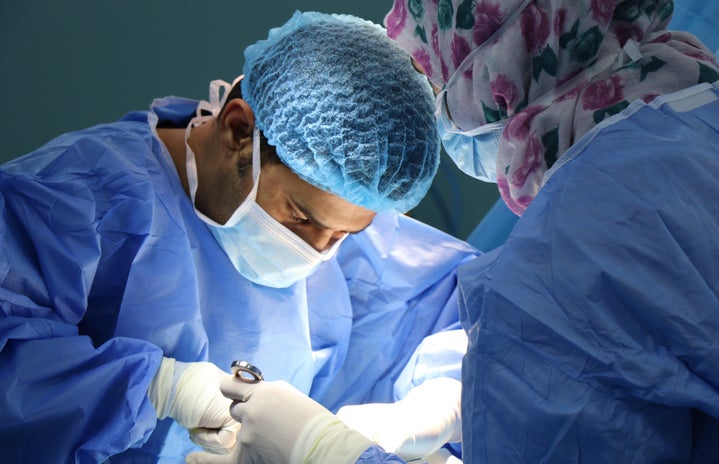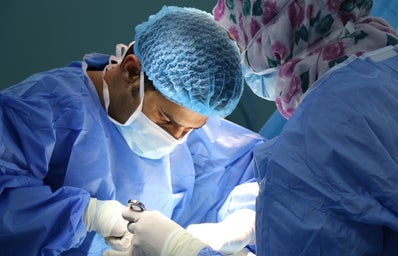content warning // fatphobia, mentions of suicide, homophobia, disordered eating
I realized I wasn’t “normal” as early as kindergarten. I have a distinct memory of watching my classmates walk around the track framing the boundaries of our elementary school playground and seeing a boy and a girl side by side. I’ve always had a love for sitting back and noticing the larger visual pictures of life, which might have also had something to do with anxiety problems I would encounter years down the line. That day, I remember seeing these classmates of mine walking next to each other and paying special attention to the girl. Did I want to take her place beside the boy, or did I want to become her? Did I want to become a girl? At the time I didn’t know what this meant.
My mother decided I was to be a boy, and I was fine with that, but I always felt as if something about that was wrong. I didn’t like wearing the Mexican rancher clothes that every other man in my family wore. And I especially couldn’t stand those goddamn alligator skin boots she tried to get me to wear as a child. Button-down shirts were the worst. I would put them on and look at myself in the bathroom mirror, believing something was wrong with my body. Not that I was born in the wrong body, but that the version of me that I was made to be by my family didn’t fit my own vision of my existence.
It wasn’t until I entered middle school that I found out about transgender identities. Some of my best friends identified as transgender and non-binary, and this newfound exposure allowed me to receive invaluable information on identity formation. However, I still struggled to find out who I was, especially in middle school when everyone was going through changes with their bodies and identities. My voice began to drop. I began growing body hair. I grew taller, ending up at the average height for men – a reasonable five foot eight inches. At the same time, my depression was worsening. I found it hard to live at times, especially because of the endless teasing I received for being gay. At least, people perceived me as gay, and this brought on years of persecutions from my peers.
Gym locker rooms, both in middle and high school, were the worst for me. Besides the horrid smells, I had to fight the pain of being placed in a male locker room, forced to change in front of people I couldn’t physically relate to. In my puberty years I knew I wasn’t a boy, but I still didn’t know who I was supposed to be. Changing in the male locker rooms also caused me to expose my fatness. Body image was something I’ve struggled with throughout my entire life since I’ve long since refused to adapt to rules of thinness. I knew I could do what I wanted with my eating habits, but I was constantly being fat shamed by my family members. Moreover, maintaining a thin social image in the eyes of my peers was something I couldn’t force myself to do. It was exacerbated to such an intense point that I developed an eating disorder in high school, and, to this day, I struggle with disordered eating habits.
While I was struggling with so much in my life, I began applying to universities across the country in an attempt to escape my hometown and chase my dreams of being an astrophysicist. Jokes on everyone who supported me for this — I ended up being a literary critic in borderline pornographic queer literature. That same senior year, I came out as non-binary. Keeping my legal name, I left for Chapel Hill, North Carolina in the fall semester of 2019. While there I came across people who loved me for me and encouraged me to embrace my identity.
It wasn’t until August 28, 2020 that I began medically transitioning and using a different name. For the first time in my life, I could say that I was happy with where the changes in my body were going. I was growing a bigger chest. My skin was softening. My thick body hair was thinning out and becoming something beautiful for me. I was allowed to choose to take estrogen, and my friends and doctors supported me all along the way. Never once did I have the shape of my body mentioned unless I brought up changes I was noticing; for example, I had a positive conversation on the changes of my hip size with my trans health doctor.
Fast forward to October 10, 2022. I was driving to see a surgeon who was experienced in performing bottom surgeries for trans patients. At this point I had been living as a transgender woman for a year and had been on hormone replacement therapy for two years. I was incredibly excited to talk to a real surgeon about how to move forward with receiving life-saving and gender-affirming care. As soon as I stepped into the doctor’s office, I was weighed; this bothered me a bit, but I didn’t pay it much mind. I also made sure to not look down at my weight since I knew that it would throw me completely off. I sat down to speak to a nurse who worked closely with the surgeon. She walked me through the history of my transition and referred me to a bunch of other doctors specializing in body hair removal and top surgery. Then, the worst thing happened. I was told I needed to drop at least thirty to forty pounds in order to receive bottom surgery. My BMI was apparently too high. I know I could’ve said something to her, but I was taken aback by her words and I was hurt. The surgeon came in after she was done and told me the same thing. I needed to drop nearly twenty percent of my body weight; otherwise, I wouldn’t have my penis removed. This was due to the possibility of complications during the surgery, which was meant to construct a vagina I didn’t have. I listened to his words, and then I left. I came to the hospital excited to find out the direction of my gender identity. I left defeated and broken. I drove home in silence and cried once I got home. I cried a lot. I looked at myself in my bedroom mirror and saw two decades worth of self-hatred and internalized fatphobia manifesting itself in the current version of myself. As I’m writing this I still can’t believe this happened to me. It really sucks, to say the least. I still want the surgery, and I can’t go anywhere else because I don’t have enough money to find a different doctor.
And now I’m angry. I’m furious. The possibility of complications due to the construction of a vaginal canal?? A serious surgery possibly hurting me?? I understand this, but I don’t understand why fatphobic medical providers think that fat people are incredibly unhealthy persons. I’m not. I’m healthy; I just so happen to be fat. And what about a skinny trans girl being put in the same position? Would she even be told to lose weight? No. Anyone undergoing major surgery will face the same risks regardless of their size. I don’t want to be skinny. I want to be me. I want a vagina. I want to be happy with my body, and I’ll do whatever it takes to achieve this goal. Even if it means putting myself through mental pain to become wholly me. And I place this blame, this hurt, on every doctor who ever told me to lose weight to become prettier in their eyes.


